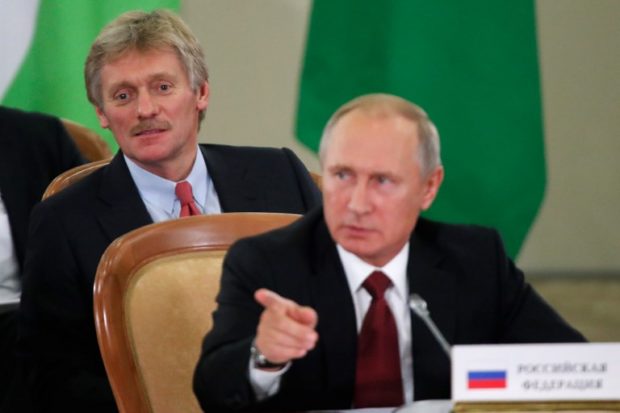Russia blasts ‘unacceptable’ new US sanctions

Russia’s President Vladimir Putin (front) and Kremlin spokesman Dmitry Peskov attend a session of the Council of Heads of the Commonwealth of Independent States (CIS) in Sochi on October 11, 2017. / AFP PHOTO / POOL / MAXIM SHEMETOV
MOSCOW — The Kremlin on Thursday branded as “unacceptable” new US sanctions against Russia over its alleged role in a nerve agent attack on a former spy, as the ruble and Russian stocks tumbled.
The action by the US State Department is the latest salvo in a series of disputes between the rival powers, and comes less than a month after US President Donald Trump met his Russian counterpart Vladimir Putin in Helsinki.
The State Department said Wednesday the new sanctions were in response to “the use of a ‘Novichok’ nerve agent in an attempt to assassinate UK citizen Sergei Skripal” — who was a Russian double agent — and his daughter Yulia on English soil in March.
They are aimed at punishing Putin’s government for having “used chemical or biological weapons in violation of international law,” spokeswoman Heather Nauert said in a statement.
But the punitive measures — which were welcomed by Britain — triggered a furious response from Moscow.
Article continues after this advertisement“We consider categorically unacceptable the linking of new restrictions, which we as before consider illegal, to the case in Salisbury,” Kremlin spokesman Dmitry Peskov told journalists.
Article continues after this advertisementHowever, he added that “Moscow retains hopes of building constructive relations with Washington.”
The ruble sank to 66.48 against the dollar, its lowest since November 2016, while the Russian stock market index RTS dropped 3.2 percent and the MOEX nearly 1.2 percent at around 0745 GMT, before rebounding slightly.
Russian banks were also affected, with shares in state-run Sberbank sliding 4.7 percent.
Threat of wider sanctions
The move could cut off hundreds of millions of dollars worth of exports to Russia, according to another senior State Department official, who requested anonymity in order to speak about the sanctions.
The official told reporters that the administration decided to impose a “presumption of denial” for the sale to Russia of “national security sensitive” US technologies that require federal government approval.
Such technologies have often been used in items including electronic devices as well as calibration equipment. The exports were previously allowed on a case-by-case basis.
In the event of non-compliance, the official added, a second round of “draconian” sanctions would be given a green light. These could go as far as a ban on Russian airlines using US airports.
Shares in Russia’s main airline Aeroflot plunged by more than 10 percent but later rebounded.
The latest US action follows the Treasury’s imposition of sanctions in March against 19 Russian citizens and five entities for interfering in the 2016 US election — the toughest steps against Moscow since Trump took office.
Also in March, Washington ordered the expulsion of 60 Russian diplomats, and the closure of Russia’s consulate general in Seattle.
Moscow ordered 60 American diplomats expelled in a tit-for-tat response.
‘Provocative, reckless behavior’
Britain said it welcomed the US response to the chemical attack in Salisbury, the sleepy English town where the Skripals were poisoned.
A spokesman for Prime Minister Theresa May said the sanctions send “an unequivocal message to Russia that its provocative, reckless behavior will not go unchallenged.”
“Thank you USA for standing firm with us on this,” Foreign Secretary Jeremy Hunt tweeted.
This week, Britain’s the Guardian newspaper reported London is preparing to ask Moscow to extradite two Russian citizens suspected of carrying out the Salisbury nerve agent attack.
The Skripals survived the attack but a British couple was poisoned by the same Novichok agent in a nearby town, one of whom, 44-year-old Dawn Sturgess, subsequently died.
Moscow has angrily rejected any involvement in the poisoning, plunging diplomatic relations with London into crisis.
The Russian economy is still reeling from international sanctions imposed on Moscow in 2014 over its actions in Ukraine and a crash in oil prices the same year.
While Russia returned to growth in 2017 after two years of recession, it pales in comparison with growth figures seen during Putin’s first two terms in office from 2000 to 2008 thanks to soaring oil prices.